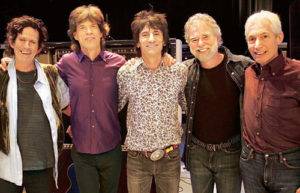Check out Stan’s first podcast on Off the Deaton Path, a new weekly feature. In the wake of the protests and violence in Charlottesville, this week he discusses a riveting new biography of Hitler.
Author Archives: Stan Deaton
Crush the Infamous
Heather Ann Thompson, Blood in the Water: The Attica Prison Uprising of 1971 and Its Legacy. Pantheon Books, 2016, 724 pp., $35.00.
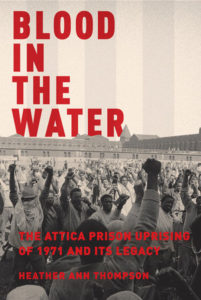 At the Henry W. Grady School of Journalism at the University of Georgia, the late great Conrad Fink—Marine lieutenant, former Vietnam War correspondent, Associated Press veteran, and journalist par excellence—taught us that above all our mission was to “comfort the afflicted, and to afflict the comfortable,” to shine the light in dark places. Wherever things are done—for good or evil—by public institutions, he said, they are done in the name of the people of this republic, and therefore the people will always have a right to know what is done in their name.
At the Henry W. Grady School of Journalism at the University of Georgia, the late great Conrad Fink—Marine lieutenant, former Vietnam War correspondent, Associated Press veteran, and journalist par excellence—taught us that above all our mission was to “comfort the afflicted, and to afflict the comfortable,” to shine the light in dark places. Wherever things are done—for good or evil—by public institutions, he said, they are done in the name of the people of this republic, and therefore the people will always have a right to know what is done in their name.
In a similar vein, Voltaire long ago taught us that we should always rage against injustice, and that those in authority will forever bear watching because they will abuse that power. When they do, call them to account for it in the strongest terms possible. Theodore Besterman, the legendary Voltaire scholar, said of his subject’s life’s work, “Voltaire did not destroy injustice, but he took the first step, he put the unjust on the defensive.” Voltaire’s motto toward the end of his life? “Crush the infamous.”
In the finest sense of both of these charges, Heather Ann Thompson has fulfilled that mission and has shined a bright light on one of the darkest places imaginable and one of the most disturbing episodes in American history, the 1971 Attica prison uprising and its aftermath. She has put injustice on the defensive and in so doing has won the 2017 Pulitzer Prize for history.
First, a full disclosure: Heather Ann Thompson is my friend. I’ve known her and her husband Jon Wells for years, and they’re both great scholars and terrific people, so I can’t pretend to be impartial about this book. I think it’s great and would like it had it won nothing but the Irving Forbush Prize.
Jon Wells for years, and they’re both great scholars and terrific people, so I can’t pretend to be impartial about this book. I think it’s great and would like it had it won nothing but the Irving Forbush Prize.
But of course you don’t have to take my word for it. The 2017 Pulitzer judges awarded this book the prize for history for “a narrative history that sets high standards for scholarly judgment and tenacity of inquiry in seeking the truth about the 1971 Attica prison riots.”
Tenacity of inquiry is putting it mildly. The state of New York has had a vested interest for over 45 years in making sure the truth of what happened at Attica—during the takeover by the inmates, during the retaking by the state, and the fallout afterward—never sees the light of day.
Why would this be so? The state’s actions at Attica—taken in the name of the people—should have been able to bear the scrutiny of the most thorough investigation. As Thomas Jefferson said, “It is error alone which needs the support of government. Truth can stand on its own.”
But this has never been the case. From that day to this, the highest officials in the state of New York have done their best to make sure that the real story of this tragic episode never got out. It defies understanding how an entirely different generation of people, many of whom were not even born in 1971, could still be complicit in continuing to cover up the truth about Attica. And yet the documentary and artifactual evidence of what happened during the five days of September 9-13, 1971, and for years afterward, has been distorted, hidden away, or deliberately destroyed.
In a truly remarkable achievement of historical research and journalistic detective work, Heather relentlessly pursued the story of Attica using every weapon at her disposal to uncover the full story of the Attica uprising, the state’s brutal retaking of the prison that killed both hostages and inmates, and the barbaric retaliation meted out to prisoners in the days, months, and years afterwards. Martin Luther King, Jr. famously said that “The arc of the moral universe is long, but it bends toward justice.” In light of the Attica story, one wonders.
In the months leading up to September 1971, many of Attica’s prisoners petitioned and crusaded for better conditions at the prison, to no avail. On the morning of Thursday, September 9, in an uprising that was totally unplanned and unrehearsed, prisoners seized a chaotic moment in which a door was unexpectedly locked to rise up in protest against prison conditions and within hours nearly 1,300 inmates had taken control of Attica Correctional Facility. Seizing state and civilian hostages working at the prison (who naturally feared for their lives but who were protected by the inmates), prisoners negotiated with state authorities for basic civil and human rights that they felt they’d too long been denied. With tensions mounting and fears for the hostages safety, Governor Nelson Rockefeller sent the New York State Police and Attica’s Correctional Officers in with tear gas raining down and guns blazing.
Twenty-nine inmates and ten hostages were killed, all by state authorities, and over a hundred more were shot. In the bloody aftermath the state retaliated unmercifully for the uprising by torturing prisoners with sadistic acts and denying them adequate medical care. The officials also lied to hostage families about who killed their loved ones, and to the American public about what really happened. From Governor Rockefeller on down, the state went to extraordinary lengths to cover up official actions, protect state police from criminal charges, all while denying any official culpability for mental and physical damage inflicted on hostage and inmate survivors and their families that continues to this day.
It’s a shameful story that Heather has dragged kicking and screaming into the light of day through Freedom of Information requests, interviews with survivors, over a decade of dogged research in archives across the country, and sheer determination to not let this story remain hidden from the public any longer. In addition to the adulation and prizes, she’s also received threats and been vilified.
As you would expect from a prize winner, this book is a compelling, page-turning read, but make no mistake: some of the graphic descriptions of what happened at Attica will—and should—turn your stomach.
The author’s attention to the smallest details is impressive. Just two examples among hundreds: on the morning the uprising began, Heather describes a moment when the inmates battered down a gate that didn’t just give way; one of the bars securing the gate to the cement “broke in half about fifteen inches down from the ceiling” (p. 54), a small nugget gleaned from a close reading of a very long after-action report. Similarly, after the retaking, inmates struggled to get word out to loved ones that they were alive, if not safe from state retribution and retaliation. They smuggled a red spiral-bound notebook from cell to cell, into which inmates wrote notes to family members in hopes it would get over the walls. State police confiscated it, and 40 years later Heather held it in her hands in a warehouse of the New York State Museum, its messages finally seeing the light of day. The notebook and the rest of the documents and artifacts she saw in that warehouse have subsequently disappeared.
After years of litigation, the state of New York finally settled with a group of former Attica prisoners in 2000, and with surviving hostages and their families in 2005. To date there have been no official apologies or admissions of wrong-doing, and no trooper or correctional officer was ever charged with a crime for their actions during the re-taking.
Blood in the Water isn’t just about what happened in 1971, of course. As we continue to live in the era of mass incarceration, the populations of this country’s ever-expanding prisons receive the least sympathy/empathy/understanding of all our fellow human beings. It’s customary for us to turn away from what happens behind those walls, secure in the knowledge that “whatever they get, they deserve. They should have thought about that before they raped, murdered, shot, stole, or…..” whatever else “they” did. When prison rebellions occur, our collective response isn’t to try to understand why, it’s to crack down even harder on the system and those in it.
What civil or human rights, after all, do convicted criminals have? That question always reminds me of the exchange between William Roper and Sir Thomas More in A Man For All Seasons, when Roper says he would cut down every law in England to get to the Devil. More replied, “And when the last law was down, and the Devil turned ’round on you, where would you hide, the laws all being flat? Yes, I’d give the Devil benefit of law, for my own safety’s sake!”
As Attica and its aftermath make clear, in a nation that holds any moral claims to standing for basic human rights, we turn a blind eye to what is done in our name—in prisons or anywhere else—at our own peril. This book is a reminder to we who need reminding that indifference to injustice and human suffering is obscene and immoral, no matter the source, and that in a self-governing republic power must always be held accountable.
As Voltaire said, “Every man is guilty of the good he did not do.”
Count Us In, Chuck
As long-suffering readers of this blog know well, I’ve had a long love affair with the Rolling Stones. I’ve seen them nine times in five different cities over the last 35 years, from the first time as a 17-year-old senior in high school to the last as a 50-year-old in the summer of 2015.
So imagine how Fan-Boy crazy I went when the Stones’ legendary keyboardist, Chuck Leavell, attended the Georgia Historical Society’s Trustees Gala in February in Savannah and yours truly got to sit with him at dinner. To say that I busted his chops would be an understatement. Turns out, he’s a huge fan of public television and was familiar with my own work on “Today in Georgia History.”
I first met Chuck for a few minutes when he gave the inaugural Mark Finlay Memorial Lecture 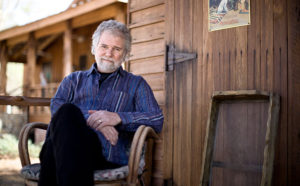 on environmental history at Armstrong State University in the spring of 2015. As you may know, Chuck and his wife Rose Lane turned her family’s plantation into a model tree farm outside Macon, and to say they’ve been good at it would be an understatement. They were jointly named National Outstanding Tree Farmers of the Year in 1999, and Chuck is the only two-time recipient of the Georgia Tree Farmer of the Year Award. The dedicated conservationist is the co-founder, with Joel Babbit, of the Mother Nature Network. In 2012 Chuck received a Lifetime Achievement Grammy for his work with the Allman Brothers Band as well as an Honorary Ranger award from the US Forest Service. Who else has done that? Take that Bob Dylan, with your Nobel Prize.
on environmental history at Armstrong State University in the spring of 2015. As you may know, Chuck and his wife Rose Lane turned her family’s plantation into a model tree farm outside Macon, and to say they’ve been good at it would be an understatement. They were jointly named National Outstanding Tree Farmers of the Year in 1999, and Chuck is the only two-time recipient of the Georgia Tree Farmer of the Year Award. The dedicated conservationist is the co-founder, with Joel Babbit, of the Mother Nature Network. In 2012 Chuck received a Lifetime Achievement Grammy for his work with the Allman Brothers Band as well as an Honorary Ranger award from the US Forest Service. Who else has done that? Take that Bob Dylan, with your Nobel Prize.
The husband, father, and grandfather is also an accomplished author of four books: Forever Green: The History and Hope of the American Forest; the autobiographical Between Rock and a Home Place; The Tree Farmer (a children’s book); and Growing A Better America.
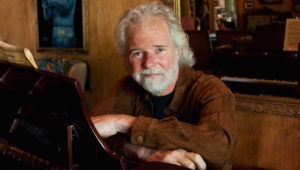 Besides his work with the Allman Brothers, Chuck’s recorded with Eric Clapton, George Harrison, the Black Crowes, Blues Traveler, Train, John Mayer, and many others, in addition to his own accomplished solo projects. The Alabama native attended the Georgia Historical Society’s Gala to honor Pete Correll, the longtime chief of Georgia Pacific and board member of the Mother Nature Network, who was appointed by Governor Deal and GHS as a Georgia Trustee this year.
Besides his work with the Allman Brothers, Chuck’s recorded with Eric Clapton, George Harrison, the Black Crowes, Blues Traveler, Train, John Mayer, and many others, in addition to his own accomplished solo projects. The Alabama native attended the Georgia Historical Society’s Gala to honor Pete Correll, the longtime chief of Georgia Pacific and board member of the Mother Nature Network, who was appointed by Governor Deal and GHS as a Georgia Trustee this year.
As in our first encounter, Chuck couldn’t have been more gracious. He is, in the words of Keith Richards, a gentleman through and through and as modest as they come. You’d never know he was at the heart of the Greatest Rock n’ Roll Band in the World, their keyboardist, erstwhile musical director, and the man who counts them in to nearly every song. Having been a Stones fan long before he became their keyboardist, Chuck in many ways is Mr. Everyman, standing in for all of us who love the band and their music dearly while spending the better part of a lifetime getting a nightly rear view—as Charlie Watts once indelicately put it—”of Mick’s bum wigglin’ about.”
And how’s this for coincidence: he made his debut with the Stones at their Atlanta concert in the Fox Theater on October 26, 1981—the first Stones concert I ever attended. Through the magic that is the internet, you can hear the soundboard recording of that magical night here.
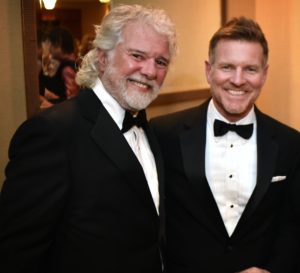 Without letting Chuck eat his dinner, I quizzed him about all things Stones, from how they stay so amazingly able to perform at such an advanced age (Mick exercises his body and voice relentlessly and rigorously watches his diet; Keith smokes and drinks), to Ronnie Wood’s newborn twins (for whom he’s given up smoking), to how long it’s all going to last. How do they first contact him to invite him to go on tour–does he look down at his cell and see Mick calling? (Sometimes, perhaps, but first the Stones’ manager Joyce Smyth sends out an email.) And so it went, on and on through every course. He answered my questions from the mundane to the sublime with unwavering politeness and an empty stomach.
Without letting Chuck eat his dinner, I quizzed him about all things Stones, from how they stay so amazingly able to perform at such an advanced age (Mick exercises his body and voice relentlessly and rigorously watches his diet; Keith smokes and drinks), to Ronnie Wood’s newborn twins (for whom he’s given up smoking), to how long it’s all going to last. How do they first contact him to invite him to go on tour–does he look down at his cell and see Mick calling? (Sometimes, perhaps, but first the Stones’ manager Joyce Smyth sends out an email.) And so it went, on and on through every course. He answered my questions from the mundane to the sublime with unwavering politeness and an empty stomach.
Many of my questions had to do with what they will and will not play live in concert, and why. As the group’s official “musical director” Chuck sets every show’s set list with Mr. Jagger and fights hard for songs that get rehearsed but rarely played live, like “Get off My Cloud” (hear Mick ask Chuck to count them in), “Lady Jane” and “Play with Fire.”
When I asked him why they don’t play early 60s standards like “Mercy, Mercy,” or “Walkin’ the Dog” live, he just laughed. He replied that people pay a lot of money to see them (don’t I know it!), and Mick and company feel they have to strike a delicate balance between playing familiar tunes like “Jumpin’ Jack Flash” that casual fans expect to hear, leaving little room for rarely played gems such as “She’s a Rainbow” and “Monkey Man” (both, incidentally, containing some of Chuck’s best work) for hard-core nuts like me.
Here’s what Chuck won’t tell you, though if you’ve followed the Stones during his tenure, you know it’s true: he’s made them a much better live band than they were before his arrival. They’re more professional, the songs are crisp and tight, giving their shows an energy and quality they lacked when everything was noticeably more ragged. In my opinion he’s a huge reason the band still plays to sold out audiences around the world well into their seventies.
know it’s true: he’s made them a much better live band than they were before his arrival. They’re more professional, the songs are crisp and tight, giving their shows an energy and quality they lacked when everything was noticeably more ragged. In my opinion he’s a huge reason the band still plays to sold out audiences around the world well into their seventies.
Chuck and Rose Lane have recently purchased a home in Savannah (not far from my office) and will be spending time here, so we’ll be neighbors for a few weeks each year.
The next sunny afternoon you stroll around Forsyth Park, you may see an unassuming white-haired, tree-farmer-looking gent walking beside you. If you pay him no mind and look the other way, you will miss the man who has been an integral part of musical history for the last third of a century and a well-respected member of rock royalty.
Take it from me: he won’t mind if you walk up and say, in Mick’s immortal words, “Please allow me to introduce myself….”
Tell him Stan said hello. And for all the pleasure—dare I say Satisfaction–you’ve given us through the years, Chuck, a heartfelt and sincere thank you. I like it, like it, yes I do.
Guilty as Charged
A lot of people in Atlanta took umbrage at Dan Shaughnessy’s column in the Boston Globe about how disappointed the New England Patriots must be in having to play the Falcons in the Super Bowl. He didn’t really say anything bad about the Falcons or Atlantans, oddly enough. The gist of his argument is that Atlantans aren’t die-hard professional sports fans (and thus aren’t worthy of a spot in the NFL’s big game), but are instead crazy about college football.
how disappointed the New England Patriots must be in having to play the Falcons in the Super Bowl. He didn’t really say anything bad about the Falcons or Atlantans, oddly enough. The gist of his argument is that Atlantans aren’t die-hard professional sports fans (and thus aren’t worthy of a spot in the NFL’s big game), but are instead crazy about college football.
Guilty.
Don’t get me wrong, I love and support all of Atlanta’s professional sports team, and have all of my life, as numerous of these tedious blog posts will attest. I stand second to none in my fanaticism for the Braves, Falcons, and Hawks. Heck, I even loved the long-defunct Atlanta Flames and still support them in Calgary. I know that they currently own the 8th and last playoff spot in the NHL’s Western Conference right at this red-hot second. Find three other people south of the Mason-Dixon line who care about that, I dare you.
But yes, college football is king here. And news flash: we aren’t alone.
The Northeast is the only place where the love of pro football wins out over the college game because, with the exception of Boston College (for whom our beloved Matty Ice played), there is no college football north of Philadelphia worthy of the name. Rutgers doesn’t count, despite playing—if you can call Rutger’s performance last year “playing”—in the Big Ten.
Combine that with the fact that the Patriots are really, really good—as are the other Boston teams usually—and it’s understandable why professional sports fans there are legion.
Our fanaticism here is not because of the dearth of professional championships in Atlanta sports.
It’s because college football is more exciting and more fun to watch, in my humble and uninformed opinion.
The rivalries are much more intense, and the game-day atmosphere at big-time college football games is unmatched in any other sport. Any. Shaughnessy referenced lack of excitement in Atlanta last April about a Celtics-Hawks playoff matchup (which the Hawks won, by the way). Is he kidding? Seriously? The NBA?
For game-day excitement, try the Big House in Ann Arbor when Michigan plays Ohio State (ask Michigan alum Tom Brady about it). Or the Horseshoe in Columbus when it’s played there. Or in Oklahoma during Bedlam. Utah during the Holy War or Oregon’s Civil War. Also try finding cool names like these for NFL rivalries. You won’t.
The NFL has nothing—nothing—to compare to the Iron Bowl. Or the World’s Largest Outdoor Cocktail Party. Notre Dame vs. Southern Cal. Texas and Texas A&M (though temporarily suspended). Catholics vs. Convicts.
I’m not saying there aren’t great rivalries in the NFL—the Redskins and Cowboys, Patriots and Jets, and Packers and Bears all come to mind. Heck, the Falcons and Saints don’t like each other. And the best rivalries in baseball are the Yankees and Red Sox and Cubbies vs. Cards.
But it’s not the same as the blood feuds in college football, where many of these rivalries go back 130 years. The NFL has been around since the 1920s, but most franchises—including the Patriots—barely predate the 1960s. And rivalries are divisional (Cowboys-Redskins) not geographical, like Florida and Florida State, and don’t have nearly the emotional intensity of a life and death college football grudge match.
Boston’s a great sports town, make no mistake, and I can understand how the mighty Patriots might have wanted to play a different team, with a greater championship legacy. It’s like Montreal playing Phoenix in the Stanley Cup—hockey in Arizona?
But here’s a fact: when the Patriots won their first Super Bowl in 2002, they had played previously in two Super Bowls (1986 & 1997), exactly one more than the Falcons (1998) at that time. And they had lost both of those games, to the more storied NFL franchises, the Bears and the Packers.
Yes, they’ve won four since, but we all have to start somewhere, including the Patriots. Pittsburgh had won 4 Super Bowl titles before the Patriots ever even appeared in the big game for the first time in 1986.
In sports as in life, all glory is fleeting. One should be wary of acting too smug about how supreme your team is over time. The Dallas Cowboys have wandered in the playoff and championship wilderness for 20 years now after Troy Aikman and Emmitt Smith retired, and perhaps that fate awaits the Pats once Brady and Belichick are gone—which they will be one day.
Brady is a once-in-a-lifetime QB, and Belichick a once-in-a century coach. Their impact on that team is not unlike Michael Jordan’s and Coach Phil Jackson’s for the Chicago Bulls in the NBA. How many titles have the Bulls won without them? Zero.
Like Cowboys fans now, one can easily imagine a time in the not-so-distant future when Pats fans might be thrilled to play in the Super Bowl again after a long, long dry spell that nobody ever foresees when the champagne is flowing. They might one day even be thrilled to be playing against the Atlanta Falcons.
Rise up.
O Lost, and By the Wind Grieved
So my end-of-the year wrap-up blog is over two weeks late. That’s in part because I took a moment to enjoy the four days of cold weather that descended upon Savannah two weeks ago. Have no fear, this isn’t going to descend into another rant about the weather, but winter this year in Savannah was apparently scheduled for the four days surrounding that weekend, and I paused to enjoy it. It’s now spring again, here in mid January. Air-conditioners are running, trees are blooming, and grass will soon be growing and in need of trimming. Atlanta missed a record high on Christmas Eve by one degree, and came perilously close on Christmas Day. That’s two years in a row that bathing suits have been more in order at Yuletide than sweaters, and yours truly doesn’t like it. I don’t like it all. Okay, so it turned into a short rant about the weather. Sorry.
One good thing about delaying this column is that it gives me a chance to congratulate the Atlanta Falcons for winning their division, locking up the second seed in the NFC playoffs, a first-round bye, and a divisional win over the Seattle Seahawks. The rematch with the Green Bay Packers in this weekend’s NFC championship game will be a good one. Stay tuned.
 We can also congratulate the Clemson Tigers on knocking off the top-ranked Alabama Crimson Tide (after shutting out Ohio State) and winning the college football national championship. It’s not easy to beat Urban Meyer and Nick Saban, as Clemson did in this year’s playoff. The Tigers needed nearly all 60 minutes to beat Bama, but when it was over they had won their first national title in 35 years, thanks in large part to Gainesville native Deshaun Watson. How the Georgia schools let him get away is beyond me, but there he was wearing orange and purple and standing on the championship stage afterward. My prediction: Bama will be back in the playoff next year, and Clemson will be at home watching, with Watson and lot of other talent moving on. Everyone else has to rebuild; Saban just reloads and starts shooting again.
We can also congratulate the Clemson Tigers on knocking off the top-ranked Alabama Crimson Tide (after shutting out Ohio State) and winning the college football national championship. It’s not easy to beat Urban Meyer and Nick Saban, as Clemson did in this year’s playoff. The Tigers needed nearly all 60 minutes to beat Bama, but when it was over they had won their first national title in 35 years, thanks in large part to Gainesville native Deshaun Watson. How the Georgia schools let him get away is beyond me, but there he was wearing orange and purple and standing on the championship stage afterward. My prediction: Bama will be back in the playoff next year, and Clemson will be at home watching, with Watson and lot of other talent moving on. Everyone else has to rebuild; Saban just reloads and starts shooting again.
Another Goodbye to Another Good Friend: If you’re on social media at all, then you know that 2016 went down as one of the most unpopular years in recent memory, if we could take votes on such things. It was certainly a bad year for deaths in the entertainment industry, as you no doubt noticed yourself and as many other people have pointed out. The deaths of David Bowie, Prince, Glenn Frey, and many others left a huge void, and they’ve all been lovingly remembered and mourned on cultural and social media. There were many other famous passings, from Muhammad Ali to Nancy Reagan.
But lost among all those big names were some lesser stars in the firmament that you may or may not have heard of but should have. We’ll pause for a moment here and take one last look back at some other folks who shook off this mortal coil in 2016:
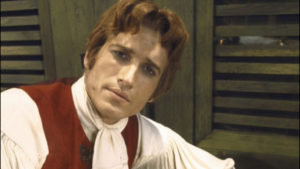 Though you may have missed it, Thomas Jefferson died in 2016, 190 years after his first death. Okay, so it wasn’t that Jefferson. But all the millions of fans of the movie musical 1776—of which I happen to be one—fondly remember Ken Howard’s lighthearted portrayal of Thomas Jefferson, long before he became The White Shadow on TV. The Tony- and Emmy-award-winning Howard died on March 23 at age 71.
Though you may have missed it, Thomas Jefferson died in 2016, 190 years after his first death. Okay, so it wasn’t that Jefferson. But all the millions of fans of the movie musical 1776—of which I happen to be one—fondly remember Ken Howard’s lighthearted portrayal of Thomas Jefferson, long before he became The White Shadow on TV. The Tony- and Emmy-award-winning Howard died on March 23 at age 71.
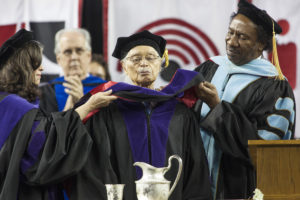 Horace Ward, born in LaGrange, Georgia, was the first African American to attempt to batter down the wall of segregation that prevented black students from attending the University of Georgia. In 1950 he applied to UGA Law School and was turned down, despite a stellar undergraduate career at Morehouse and Atlanta University. Ward tried and failed for nearly a decade to overturn the decision in court, but his case helped eventually to end segregation at Georgia’s flagship university after 175 years, when Hamilton Holmes and Charlayne Hunter were admitted in 1961. Ward went on to become the first African American ever to serve on the federal bench in Georgia, though he shamefully had to go elsewhere to earn his law degree. Judge Horace Taliaferro Ward died at the age of 88 on April 23 and is buried in Atlanta’s Westview Cemetery.
Horace Ward, born in LaGrange, Georgia, was the first African American to attempt to batter down the wall of segregation that prevented black students from attending the University of Georgia. In 1950 he applied to UGA Law School and was turned down, despite a stellar undergraduate career at Morehouse and Atlanta University. Ward tried and failed for nearly a decade to overturn the decision in court, but his case helped eventually to end segregation at Georgia’s flagship university after 175 years, when Hamilton Holmes and Charlayne Hunter were admitted in 1961. Ward went on to become the first African American ever to serve on the federal bench in Georgia, though he shamefully had to go elsewhere to earn his law degree. Judge Horace Taliaferro Ward died at the age of 88 on April 23 and is buried in Atlanta’s Westview Cemetery.
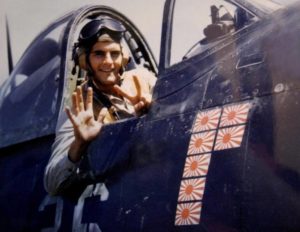 On April 22, 1945, Jerry O’Keefe of Ocean Spring, Mississippi, shot down five Japanese planes over Okinawa in his first aerial dogfight. He was 21 years old. After the war he went into the insurance business and became mayor of Biloxi, where—Mississippi born and bred—he faced down and arrested members of the Ku Klux Klan who marched there without a permit. The Klan sent him death threats and burned a cross on his lawn. The warrior who earned the Air Medal, the Navy Cross, the Distinguished Flying Cross, and the Congressional Gold Medal died on August 23 at age 93.
On April 22, 1945, Jerry O’Keefe of Ocean Spring, Mississippi, shot down five Japanese planes over Okinawa in his first aerial dogfight. He was 21 years old. After the war he went into the insurance business and became mayor of Biloxi, where—Mississippi born and bred—he faced down and arrested members of the Ku Klux Klan who marched there without a permit. The Klan sent him death threats and burned a cross on his lawn. The warrior who earned the Air Medal, the Navy Cross, the Distinguished Flying Cross, and the Congressional Gold Medal died on August 23 at age 93.
It took William H. McNeill ten years to write The Rise of the West: A History of the Human Community, but after its publication in 1963 it became a surprising best seller and won the National Book Award for history and biography. As Clifton Fadiman said, it is “deeply reflective, the work of a master scholar.” Hugh Trevor-Roper, no slouch himself, called it “the most learned…the most intelligent…the most stimulating and fascinating book that has ever set out to recount and explain the whole history of mankind.” It remains unsurpassed in scope and breadth, one of 20 books that McNeill wrote in a long and distinguished career. If you haven’t read it, you should. McNeill died on July 8 at 98.
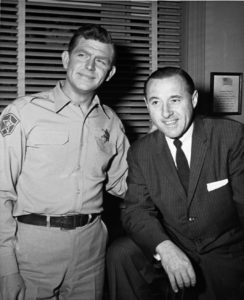 Andy Griffith fans everywhere (like me) have Richard Linke to thank for Griffith’s discovery and the TV show that brought him worldwide fame as the mighty sheriff of Mayberry. While working for Capitol Records, Linke was sitting by his radio one clear night in 1953 when he picked up a southern station broadcasting Griffith’s recording of “What it Was, Was Football.” Linke knew something special when he heard it. He flew immediately to North Carolina, bought the rights to the record for Capitol for $10,000, signed Griffith to a contract, and managed his career for the rest of his life. As Griffith put it, “had it not been for him, I would have gone down the toilet.” Linke died on June 15 at 98.
Andy Griffith fans everywhere (like me) have Richard Linke to thank for Griffith’s discovery and the TV show that brought him worldwide fame as the mighty sheriff of Mayberry. While working for Capitol Records, Linke was sitting by his radio one clear night in 1953 when he picked up a southern station broadcasting Griffith’s recording of “What it Was, Was Football.” Linke knew something special when he heard it. He flew immediately to North Carolina, bought the rights to the record for Capitol for $10,000, signed Griffith to a contract, and managed his career for the rest of his life. As Griffith put it, “had it not been for him, I would have gone down the toilet.” Linke died on June 15 at 98.
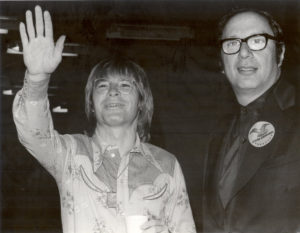 Producer and arranger Milt Okun performed a similar service for music fans. He helped create the Chad Mitchell Trio and when Mitchell left in 1965, Okun discovered and hired Henry John Deutschendorf, Jr. to replace him. Okun turned John Deutshchendorf into John Denver and produced and published the music that made him a folk and pop legend. The man who gave the world the musical gift of the Bard of the Rocky Mountains died on November 15 at age 92.
Producer and arranger Milt Okun performed a similar service for music fans. He helped create the Chad Mitchell Trio and when Mitchell left in 1965, Okun discovered and hired Henry John Deutschendorf, Jr. to replace him. Okun turned John Deutshchendorf into John Denver and produced and published the music that made him a folk and pop legend. The man who gave the world the musical gift of the Bard of the Rocky Mountains died on November 15 at age 92.
If you’re a fan of classic cartoons like me, you’ve heard the voice of Janet Waldo all of your life. She was the female Mel Blanc, bringing dozens of animated characters to life over the last 60 years, from Josie in “Josie and the Pussycats,” to Judy Jetson, Penelope Pitstop, and Fred Flintstone’s mother-in-law. She died on June 12 at the age of 96.
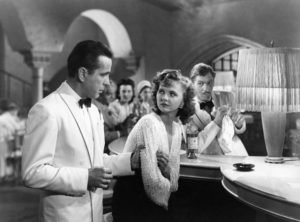 And if you’re a devotee of classic movies, one death last year was especially notable: Madeleine Lebeau was 19 years old when she was cast as Yvonne in Casablanca, and she achieved screen immortality by singing “La Marseillaise” with tears streaming down her face. When she died on May 1 at age 92, the French culture minister Audrey Azoulay said, “She will forever be the face of French resistance.” Lebeau was the last surviving credited cast member of what is arguably the best film ever made.
And if you’re a devotee of classic movies, one death last year was especially notable: Madeleine Lebeau was 19 years old when she was cast as Yvonne in Casablanca, and she achieved screen immortality by singing “La Marseillaise” with tears streaming down her face. When she died on May 1 at age 92, the French culture minister Audrey Azoulay said, “She will forever be the face of French resistance.” Lebeau was the last surviving credited cast member of what is arguably the best film ever made.
There were other “lasts” who died in 2016: Bill Herz was the last surviving crew member of Orson Welles’ “War of the Worlds” 1938 radio broadcast that terrified listeners with the news of Martians invading New Jersey. Herz died on May 10 at 99.
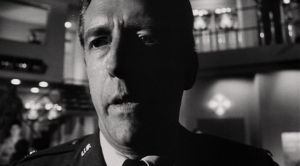 Two other big-screen deaths of note: Fritz Weaver was an all-purpose actor who appeared in dozens of movies and TV shows since the 1950s, but to my mind his most notable role was as the paranoid Air Force Colonel Cascio, who refuses to help the Russians shoot down American planes in the 1964 Cold War thriller Fail Safe. Diehard “Twilight Zone” fans will remember him from the episodes “Third From the Sun” and “The Obsolete Man.” He died November 26 at age 90.
Two other big-screen deaths of note: Fritz Weaver was an all-purpose actor who appeared in dozens of movies and TV shows since the 1950s, but to my mind his most notable role was as the paranoid Air Force Colonel Cascio, who refuses to help the Russians shoot down American planes in the 1964 Cold War thriller Fail Safe. Diehard “Twilight Zone” fans will remember him from the episodes “Third From the Sun” and “The Obsolete Man.” He died November 26 at age 90.
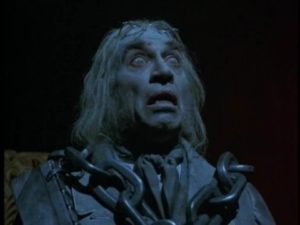 Similar to Weaver, Frank Finlay had a long and distinguished career across the stage and screen, but every Christmas he returns as Jacob Marley’s ghost in the 1984 George C. Scott version of A Christmas Carol, the best of them all, in my humble and uninformed opinion. Finlay died on January 30 at 89.
Similar to Weaver, Frank Finlay had a long and distinguished career across the stage and screen, but every Christmas he returns as Jacob Marley’s ghost in the 1984 George C. Scott version of A Christmas Carol, the best of them all, in my humble and uninformed opinion. Finlay died on January 30 at 89.
The 1990s TV show “Homicide: Life on the Street” was groundbreaking television and is considered by many to be one of the best shows ever produced. I happen to be one of those people. 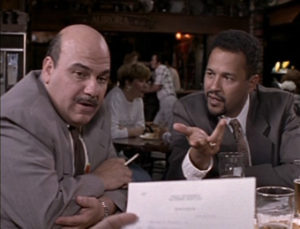 One of the finest episodes was Season Three’s “Crosetti,” which explored the suicide of Detective Steve Crosetti and its devastating impact on his fellow officers. Jon Polito played Crosetti for only two seasons but he left an indelible mark on the show, as well as the numerous characters he created as a stock player in several Coen Brothers’ films, including The Big Lebowski. He also played Jerry and Kramer’s landlord in the Season Nine “Seinfeld” episode “The Reverse Peephole.” Jon Polito died on September 1 at age 65.
One of the finest episodes was Season Three’s “Crosetti,” which explored the suicide of Detective Steve Crosetti and its devastating impact on his fellow officers. Jon Polito played Crosetti for only two seasons but he left an indelible mark on the show, as well as the numerous characters he created as a stock player in several Coen Brothers’ films, including The Big Lebowski. He also played Jerry and Kramer’s landlord in the Season Nine “Seinfeld” episode “The Reverse Peephole.” Jon Polito died on September 1 at age 65.
 A personal memory: my mother had a wonderful and eclectic album collection when I was growing up, and one of my favorites was the steel guitar sounds of Al Caiola. You may think you don’t know him but you do: he recorded scores of instrumental versions of movie and TV show themes that became big hits and the soundtrack of a generation, most famously “The Magnificent Seven” and “Bonanza.” The next time you hear Paul Anka’s “Put Your Head on My Shoulder,” Neil Sedaka’s “Calendar Girl,” Bobby Darin’s “Mack the Knife” or “Splish-Splash,” Simon & Garfunkel’s “Mrs. Robinson,” Johnny Mathis’ “Chances Are,” Del Shannon’s “Runaway” and Ben E. King’s “Stand by Me,” you’re listening to the great guitarist who died in a New Jersey nursing home on November 9. He was 96.
A personal memory: my mother had a wonderful and eclectic album collection when I was growing up, and one of my favorites was the steel guitar sounds of Al Caiola. You may think you don’t know him but you do: he recorded scores of instrumental versions of movie and TV show themes that became big hits and the soundtrack of a generation, most famously “The Magnificent Seven” and “Bonanza.” The next time you hear Paul Anka’s “Put Your Head on My Shoulder,” Neil Sedaka’s “Calendar Girl,” Bobby Darin’s “Mack the Knife” or “Splish-Splash,” Simon & Garfunkel’s “Mrs. Robinson,” Johnny Mathis’ “Chances Are,” Del Shannon’s “Runaway” and Ben E. King’s “Stand by Me,” you’re listening to the great guitarist who died in a New Jersey nursing home on November 9. He was 96.
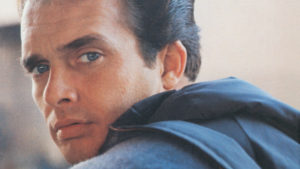 Finally, the man known to his legion of fans as The Hag died on his 79th birthday on April 6. As Keith Richards said, “One of the great country singers of all time and a helluva guitar player. Gonna miss you pal.”
Finally, the man known to his legion of fans as The Hag died on his 79th birthday on April 6. As Keith Richards said, “One of the great country singers of all time and a helluva guitar player. Gonna miss you pal.”
Literary Mountains Climbed: In 2016 I read 31 books totaling almost 12,000 pages. Among them were two that I’ve had on my list for a long time: War and Peace by Leo Tolstoy, and Thomas Wolfe’s Look Homeward, Angel.
 Tolstoy’s masterpiece, first published in 1869, is as advertised, one of the best books I’ve ever read. Don’t let its size daunt you: the version I read, Easton Press’s leather-bound edition in its series “The 100 Greatest Books Ever Written,” came in at 1,035 closely written pages. The Count of Monte Cristo and Les Miserables were both longer. It took me 45 days to read, an average of 23 pages a day. That’s easily doable, and most days I read closer to 30-40. It was well worth the time and effort.
Tolstoy’s masterpiece, first published in 1869, is as advertised, one of the best books I’ve ever read. Don’t let its size daunt you: the version I read, Easton Press’s leather-bound edition in its series “The 100 Greatest Books Ever Written,” came in at 1,035 closely written pages. The Count of Monte Cristo and Les Miserables were both longer. It took me 45 days to read, an average of 23 pages a day. That’s easily doable, and most days I read closer to 30-40. It was well worth the time and effort.
For all of its reputation, it’s not hard to read, and the Russian names are not hard to follow. The best advice I can offer is just start reading and keep at it; the names will sort themselves out in good time, and the story will carry you along. Tolstoy is not Dostoyevsky; he doesn’t drill down a thousand feet, he is not concerned with the abstract, the unconscious, or the abnormal. Tolstoy is focused on human life, in all its vastness and complexity, and that’s his real subject in this book. The book drops down into a group of people’s lives and it leaves them still struggling at the end. Along the way, you learn a lot about them, about the choices we all make as human beings—and you’ll learn about yourself as well. As literary critic Clifton Fadiman said so well, “once a few minor hazards are braved, this vast chronicle of Napoleonic times seems to become an open book, as if it had been written in the sunlight.” This is a timeless book with its own rhythm that will have a lasting effect on you long after you finish it, as all great books do. Read it like eating an elephant, one bite at a time. You will not regret it.
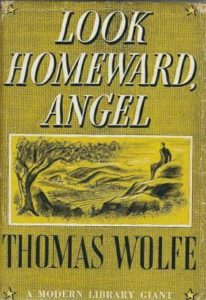 Thomas Wolfe’s “young-man-from-the-provinces” theme in his semi-autobiographical Look Homeward, Angel: A Story of the Buried Life (1929) will be familiar to anyone who’s read Stendahl’s classic The Red and the Black. Wolfe of course takes the genre to another level and inspired a host of writers since. I had long imagined Wolfe to be as impenetrable as William Faulkner, but in this I was completely wrong.
Thomas Wolfe’s “young-man-from-the-provinces” theme in his semi-autobiographical Look Homeward, Angel: A Story of the Buried Life (1929) will be familiar to anyone who’s read Stendahl’s classic The Red and the Black. Wolfe of course takes the genre to another level and inspired a host of writers since. I had long imagined Wolfe to be as impenetrable as William Faulkner, but in this I was completely wrong.
After reading A. Scott Berg’s Max Perkins: Editor of Genius, Berg’s award-winning biography of the legendary Scribner’s editor who tamed and cut Wolfe’s rambling prose down to size, I decided to tackle the novel and see for myself. Wolfe’s telling of Eugene Gant’s growing up to age 19 in Altamont, North Carolina, is a tour-de-force: ““By God, I shall spend the rest of my life getting my heart back, healing and forgetting every scar you put upon me when I was a child. The first move I ever made, after the cradle, was to crawl for the door, and every move I have made since has been an effort to escape.” The Gant family was, to put it mildly, dysfunctional before that word became stylish, and Wolfe spares no one. His real hometown of Asheville turned harshly on him when the novel was released because of his unsparing portrait, but he remains North Carolina’s most famous author. The first thing I did after I finished was to order the sequels: Of Time and the River, The Web and the Rock, and You Can’t Go Home Again, the latter two published after Wolfe’s untimely death at 37 in 1938.
Wolfe’s literary star has fallen since his death, unlike those of contemporaries Faulkner, Hemingway, and F. Scott Fitzgerald. In my uninformed opinion he towers over them all, and his books deserve to be more widely read. The title of this essay is perhaps the most famous passage from Wolfe’s first novel and the title he preferred for it. It was for good reason that critic Malcolm Cowley wrote that Wolfe was “the only contemporary writer who can be mentioned in the same breath as Dickens and Dostoevsky.”
Other Mountains Climbed in 2016: Last year in my end-of-year column I wrote that some of my 2016 goals were: “Exercise more. Run more. Read more. Write more. Listen more. Hike more. Bike more. Talk less. Eat less. Complain less. Argue less. Get angry less. Watch TV less. To pick up the phone and talk to someone I haven’t talked to in a long time. To renew friendships and make new ones. To try on a daily basis, as Thomas Jefferson so eloquently put it, to take life by the smooth handle. To meet life and its challenges and opportunities with stoicism. To try, as Marcus Aurelius said, to arise each morning and remember what a precious privilege it is to be alive.”
I succeeded in some areas (I exercised 316 days last year) and not so much in others. The list seems pretty good as I read over it again, so I’ll stick with it for this year. Whatever your goals and aspirations, I hope you succeeded in 2016.
To one and all who took the time to read a word of this blog last year—or any year—I offer my heartfelt thanks. Happy New Year, and I hope to see more of you here in 2017.

